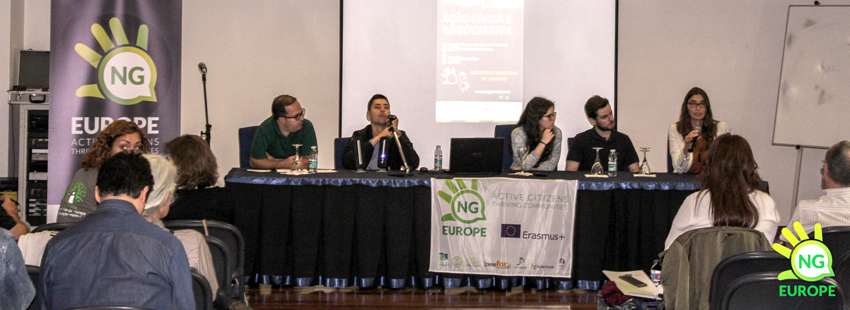On the 25th and 26th of May, the first Multiplier Event of the NGEurope project was held in Lousada. The seminar titled “Civic and Associative Action” aimed to present examples of good environmental and social NGOs in Portugal. The invited NGOs shared not only the work they do, but also a little of their history, motivations, difficulties felt along the way, opportunities created their work and, of course, the impact on their communities.
On the first day, the participants had the chance to visit the offices of Fruta Feia in Porto, an association that helps to prevent food waste by supporting local producers in selling their fruits and vegetables which are rejected by supermarkets because they are considered “ugly”. In addition to that, the activities organised in Lousada by Associação BioLiving were discussed, mainly the association’s work in Mata de Vilar, now an area of high conservation value. By being introduced to these two institutions as best practice examples, the participants were able to better understand daily work dynamics at NGOs, and to talk directly with NGO leaders about good management practices, financing, and logistics among other issues.
The second day of the seminar was dedicated to the conference where several associations shared their experience in an associative environment. Six associations, different both in mode and focus of action, but all sharing the same desire and passion to make a difference in their community, were present. The first panel started with Associação BioLiving, focused more on the preservation and conservation of nature and on the use of environmental education as a tool to raise public awareness about environmental issues. This presentation was followed by Associação Cura +, a voluntary association of pharmacists that advocates education for the proper use of medicine, thus avoiding waste, but also promoting better health. The morning ended with a presentation by the EducAfrica association represented by Inês Rodrigues, who, together with her high school students, creates low-cost energetic solutions reusing materials and taking advantage of natural materials so that these technologies can be used by communities in small villages on the African continent.
In the afternoon, Pedro Prata shared the management and nature conservation model of the Associação Transumância e Natureza that holds Portugal's first private natural reserve in the Vale do Coa area and also creates many social and educational opportunities in this rural area. This presentation was followed by Palombar, whose work focuses on the preservation of agricultural, forest and wild ecosystems and on the built heritage using traditional and sustainable techniques, especially in Trás-os-Montes, creating jobs and bringing life to the rural territories of the region. The conference ended with the Associação Escola da Floresta – Forest School Portugal, that presented a new vision regarding the pedagogical valorisation of forests and new opportunities that may arise from that.
The Multiplier Event meant two amazing days of sharing of experiences where participants and speakers could talk openly about their path in the third sector and of the difficulties they are experiencing, but mainly of the victories and opportunities that arise. One of these difficulties is the lack of opportunities for NGOs to network, get to know each other and to share their experiences. This seminar was a great way for everyone attending to be inspired and motivated to participate actively in their communities and to gather new ideas to put into practice, taking advantage of the networking opportunities that were provided.





